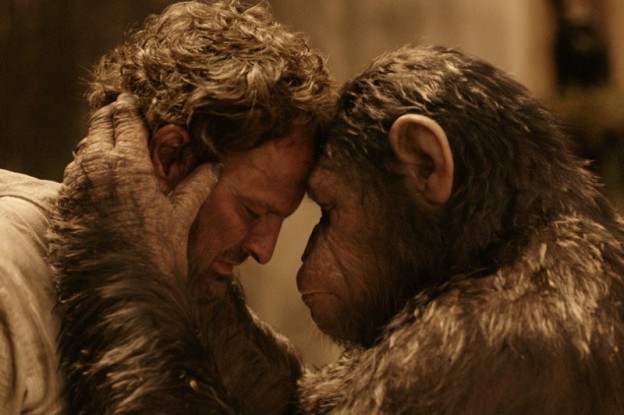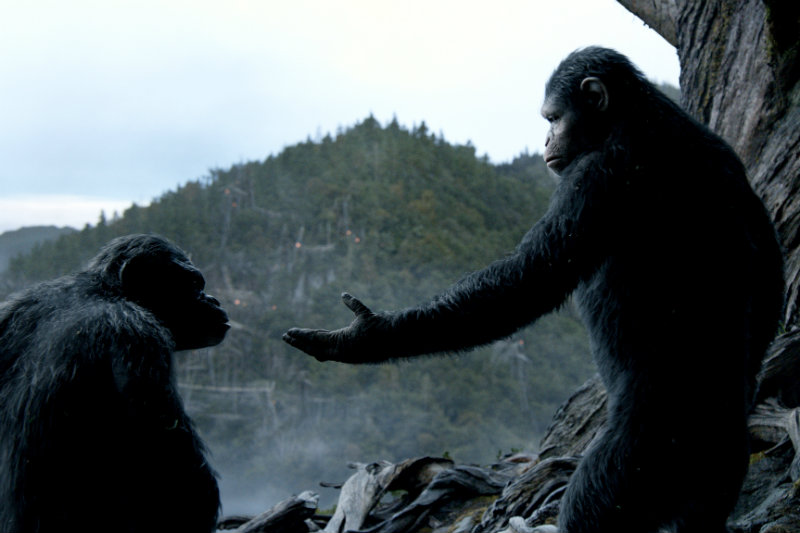For decades, sci-fi franchises like Star Wars and Star Trek have remained in the collective pop culture consciousness. Through films, television shows, video games, and the like, these properties have captured the hearts and imaginations of generations of fans, and for a while back in the late 1960s and 1970s, this was the case with Planet of the Apes as well. After all, the original 1968 film spawned four sequels, a live-action television series and an animated show. Over the years, that enthusiasm for the primate-centric world had certainly faded, but if any film can help the series reclaim its rightful place among its genre peers, it’s Dawn of the Planet of the Apes.
The film picks up a full decade after the world-altering events of 2011 franchise reboot Rise of the Planet of the Apes, which followed the beginning of the “simian flu” pandemic and the introduction of intelligent ape Caesar (Andy Serkis). Dawn finds Caesar as the head of an entire ape village living in a world where humanity is barely surviving the wasteland the viral outbreak has left in its wake. When these two worlds finally collide, the fate of both the humans and the apes hangs in the balance, with the looming possibility of war creeping ever closer.
While its predecessor managed to restore the franchise’s respectability following the mediocre 2001 Tim Burton “reimagining,” Dawn manages to elevate this reborn franchise to a whole new level of storytelling. The film’s narrative neatly dovetails with the previous film and indeed features several organic callbacks to the foundation that came before it. However, as evidenced by the loss of original star James Franco and the renewed focus on the ape side of its premise, the film is indeed its own animal (ha, ha).
From the very first frames, it’s clear that Caesar is Dawn‘s central character and moral compass. Masterfully led by Serkis’ Oscar-worthy (yeah, I said it) motion-capture portrayal, the ape leader emerges as not only the actor’s most dynamic creation yet but one of the most well-developed Hollywood protagonists in recent memory. Jason Clarke, Keri Russell and Gary Oldman provide fine support as the primary human characters, but all pale in comparison to their simian counterparts. In addition to Serkis, Toby Kebbell offers a particularly strong supporting turn as Caesar’s friend-turned-foe Koba.
The story at hand – in which Caesar aims to keep the peace between the human survivors and his ape family – goes to great lengths to establish the parallels between the two societies and, in doing so, is colored by moral complexity. Audiences are bound to find their alliances shifting from one group to the next at a moment’s notice, and by the end, they will be left marveling at the harrowing, darkly tragic portrait Dawn paints of human (and ape) nature, its violent implications and the definition of family.
By the time the credits roll, Dawn of the Planet of the Apes unravels far more than an entertaining sci-fi adventure story. Yes, the film – slickly directed by Cloverfield’s Matt Reeves – is visually arresting and loaded with intense action sequences, but its script is where the film truly shines. In fact, Dawn takes full advantage of the true nature of the sci-fi genre: to provoke intelligent discourse through social commentary. Audiences expecting a mindless thrill ride are better off checking out this summer’s Transformers: Age of Extinction, but those who are willing to experience a deep and profoundly meaningful tale that will both excite their sense and stimulate their minds, Dawn of the Planet of the Apes is hands-down the best Hollywood film so far this year.
Rating: 5 out of 5
Dawn of the Planet of the Apes stars Andy Serkis, Jason Clarke, Toby Kebbell, Keri Russell and Gary Oldman. It is directed by Matt Reeves and is now in theaters.



I like that you went into detail about the moral complexity. The unique quality about Caesar and why we want to see him prevail, is his obvious intelligence and his morality. In my opinion, these two characteristics is also what makes a human intelligent.
In the film, you don’t know what side to root for, but I know I was always rooting for Caesar 🙂